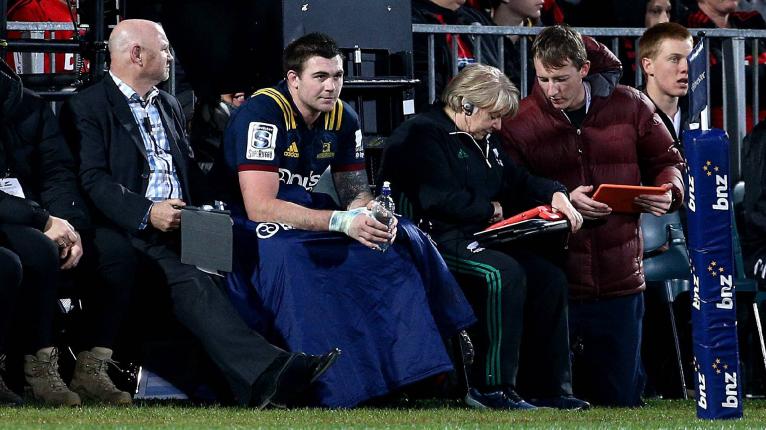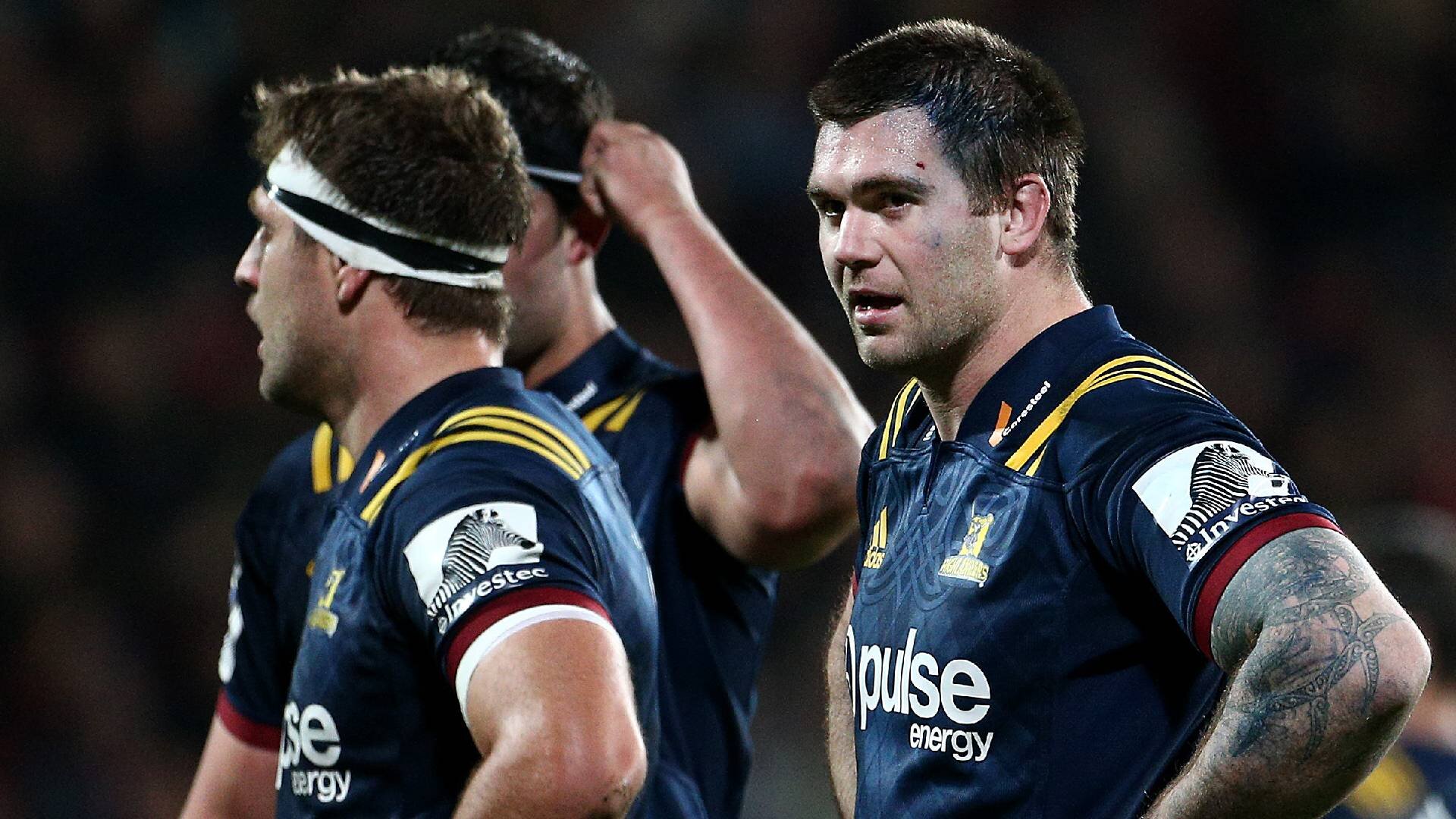The piece of ill-discipline that the All Blacks need to eradicate before the World Cup

Make no mistake about it, the return of Liam Squire to the Highlanders in the late stages of their now-completed Super Rugby campaign was of immense benefit to the franchise.
The sheer power and physicality that the 28-year-old brings to any side he plays for is hugely valuable, and he made sure people recognised his value when he returned to the field for the first time in 2019 earlier this month after knee and hip injuries, as well as off-field personal issues, thwarted the majority of his Super Rugby season.
Squire’s display against the Waratahs was especially impressive.
Needing a bonus point win to keep their play-off hopes alive, the understrength New South Welshmen were the victims of the 23-test behemoth, who was in full flight as the Highlanders stormed to a 49-12 thrashing at Rugby Park in Invercargill, which eventually secured them a berth in the competition’s quarter-finals.
Squire’s trademark barnstorming ball-carrying ability was there for all to see, with opposition first-five Mack Mason and wing Cam Clark among those to feel the full force of his power as they were used as speed bumps en route to the blindside flanker’s emphatic return to action.
His confrontational style of play isn’t just limited to when he has ball in hand, though.
The bone-crunching tackles that he’s laid upon opposition players over the past few years have bolstered his credentials as a genuine enforcer at test level, and his ferocious defensive qualities have also been prevalent upon his injury comeback.
That much was also on display in the titanic first half battle during last week’s quarter-final between the Highlanders and Crusaders at Orangetheory Stadium in Christchurch.
It was a tense, bruising 40 minutes between the two South Island rivals, and despite being the clear underdogs against a side chasing its third successive Super Rugby crown, the Highlanders were still within touching distance of their neighbours as they headed into the sheds at half-time trailing just 17-14.
The opening minutes of the second half featured more of the same as the whole first half: battering tackle collisions, brutal encounters at the breakdown, and a very clear sense of desperation between two sides who didn’t want to give an inch with a Super Rugby semi-final spot in sight.
That was until a moment of lapse in concentration cost Squire and the Highlanders dearly.
Camped just outside of their own 22 in the 44th minute, the Crusaders opted to spread the ball in wide in an attempt to play their way out of danger, and receiving the ball in the middle of the backline was Squire’s opposite, Whetu Douglas.
With Douglas looking to spread the ball out wide to speedster George Bridge on the left wing, Squire rushed up out of his position to shut down Douglas’ ball-playing options, and did so quickly enough that the Crusaders blindside flanker was forced to hang onto the ball rather than shovel it wide.
That’s exactly what Squire wanted to happen, and it worked out well for the Highlanders, as it stalled the Crusaders’ attack while Douglas braced for contact rather than choosing to spin the ball wide, and a typically jarring hit from Squire was all that was required to really emphasise the intent of the Highlanders’ defence at such a crucial point in the match.
However, it was Squire’s execution in the tackle that proved to be the killer blow for his own side, instead of the hosts.
He absolutely smashed into Douglas in what initially looked like an incredibly effective tackle that forced his victim from his feet onto his back in a split second, but Squire’s only failure came in the form of forgetting to wrap his arms around the body of Douglas.
While every other aspect of the tackle was legal, his inability to wrap his arms meant the tackle was considered a shoulder charge, and Squire consequently spent 10 minutes in the sin bin after referee Jaco Peyper reviewed the play with his television match official.

In his absence, the 14-man Highlanders conceded two converted tries, both of which came from rolling mauls that were used to capitalise on the visitor’s disadvantage in the forward pack through Squire’s dismissal.
One of the try-scorers was Douglas, and just like that, the momentum had completely swung from being anyone’s game, to fully in favour of the Crusaders.
When Squire had returned, the game was all but over with the Crusaders in control and leading by 31-14, and a second Richie Mo’unga try off the back of a Marty Banks error in the final 10 minutes handed the Highlanders a 38-14 defeat to dump them out of the competition at the quarter-final stage.
It wouldn’t be fair to entirely blame Squire’s actions for his side’s loss, as there were other areas they could have done better in throughout the game, such as the defensive capitulation in the backline that led to David Havili’s try from close range off the back of a lineout just shy of the Highlanders’ tryline.
It would be fair, though, to suggest that Squire’s indiscretion played a hugely influential role in the outcome of the match.
Playing against the Crusaders is difficult enough, but having to do so with a man down – and that man being a star All Black forward – against an almost all-All Black forward pack such as the Crusaders’ at a point in the match where the result is still very much in the balance with a lot on the line was very much detrimental to the Highlanders’ prospects of playing in a semi-final.
It’s not the first time Squire has been yellow carded for his actions against the Crusaders in a play-offs fixture, as he committed the exact same offence against Mo’unga five minutes into the rivals’ last quarter-final meeting in Christchurch two years ago.
The Highlanders weren’t punished as badly for Squire’s shoulder charge that time round – they only conceded three points from the boot of Mo’unga while Squire was sidelined during a 17-0 loss – but it presents the emergence of a concerning pattern in high-stake matches against high-quality opponents.
“We’ve got a decent scrum, so to defend with seven was pretty hard for them, but it’s a shame,” Crusaders head coach Scott Robertson said after the match.
“It’s something in this game you’ve just got to sort out, because I’d hate to see someone get injured from a shoulder charge like that.”
It’s concerning not just for the Highlanders, but for the All Blacks as well, particularly in this, a World Cup year.
Perhaps the magnitude of the occasions got to him, or maybe he just got a rush of blood with hopes of a semi-final in the back of his mind, but neither of those are valid excuses for disadvantaging your team with the game very much still intact.
Provided he stays injury-free, Squire will almost certainly be the starting blindside flanker for the All Blacks in the knockout stages of this year’s World Cup in Japan.
If it was a World Cup quarter-final instead of a Super Rugby quarter-final where he was sin-binned at such a vital point in the contest, the ramifications of his poor execution against probably either Scotland or Ireland would be much more significant.
Those ramifications would be amplified if he were to commit the same offence later on in the semi-final or grand final against sides that will be a level up from the super clinical Crusaders that he faced last week.
As mentioned earlier, make no mistake about the value of Squire.
His bone-crunching ability on either side of the ball is unparalleled compared to every other number six in New Zealand, making him an integral member of the national squad.
The intentions of his defence are unquestionably in the right place, but the level of ruthlessness in his tackling is something that Steve Hansen and co need to rectify in the coming months to prevent a repeat from occurring in October or November.
In other news:














































































